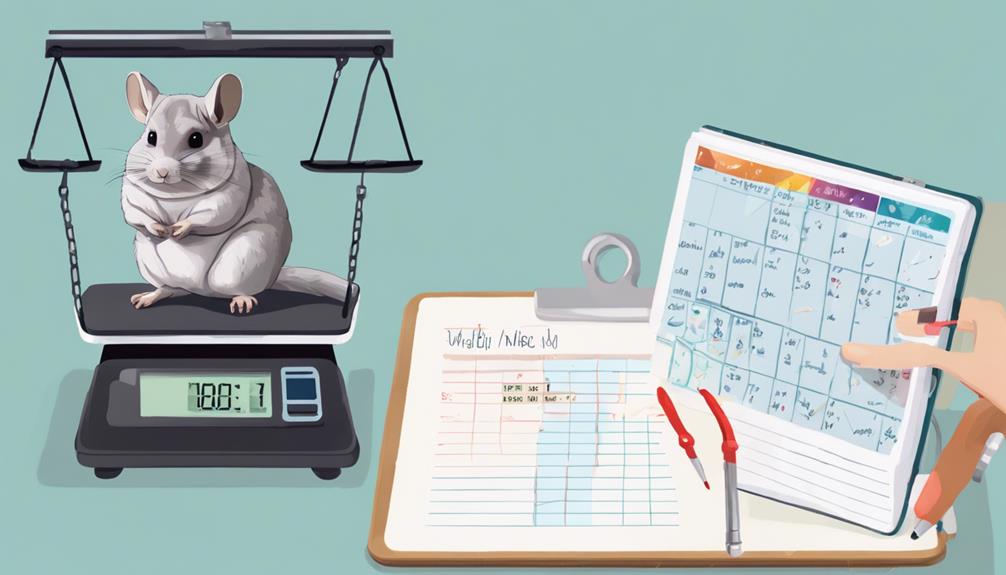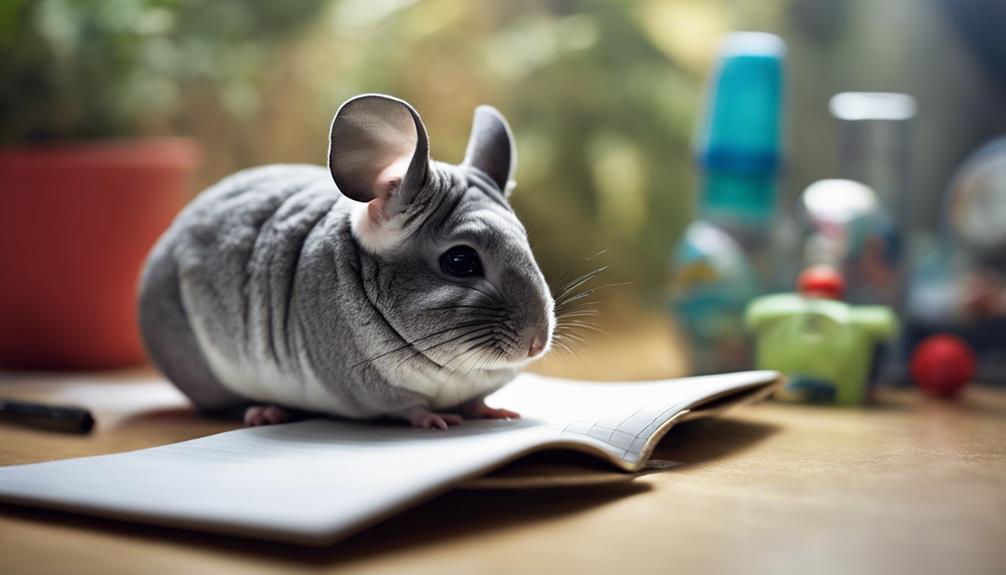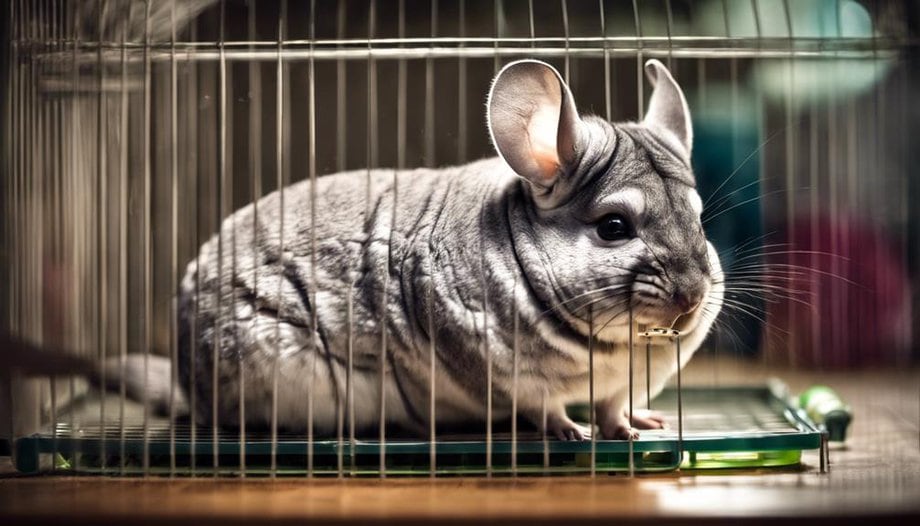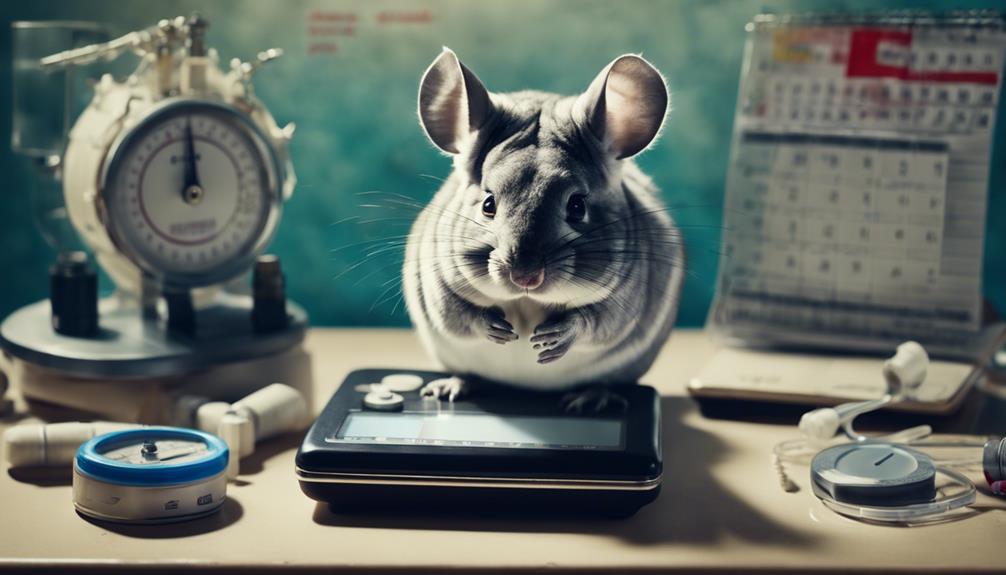How to Monitor and Record Your Chinchilla’s Health Over Time

Monitoring and recording your chinchilla’s health over time is crucial for early detection of any potential issues. Key indicators to watch for include changes in appetite, water intake, activity levels, fur quality, and weight. Additionally, keep an eye out for subtle signs such as changes in behavior, eye discharge, sneezing, or unusual odors.
Regularly tracking these indicators in a health journal can help you detect patterns or abnormalities and provide valuable information to your veterinarian. Remember, early intervention is key to maintaining your chinchilla’s health and well-being.
Understanding your chinchilla’s normal behavior and physical appearance is essential for recognizing when something is amiss. Regular health check-ups by a qualified exotic animal veterinarian are also important for preventive care and early detection of any health issues. By staying vigilant and proactive in monitoring your chinchilla’s health, you can help ensure a long and happy life for your furry friend.
Importance of Health Monitoring
Regular health monitoring of chinchillas is crucial to ensure early detection of any potential health issues. Chinchillas, like all pets, require regular check-ups to maintain their well-being. These check-ups help in disease prevention by catching any health concerns early on. By staying vigilant and conducting routine health assessments, chinchilla owners can ensure their pets lead healthy and happy lives.
During these regular check-ups, owners should pay close attention to their chinchilla’s overall appearance, behavior, and eating habits. Changes in fur quality, weight loss, lethargy, or a decrease in appetite can be indicators of underlying health issues. Additionally, monitoring dental health is essential for chinchillas as dental problems are common in this species. Providing a balanced diet rich in hay and ensuring an adequate supply of chew toys can help prevent dental issues.
Behavior Observation

Monitoring a chinchilla’s behavior provides valuable insights into its overall health and well-being. By observing your chinchilla’s social interactions, grooming habits, sleeping patterns, and vocalizations, you can better understand its mental and physical state. Here is a table to help you track and analyze your chinchilla’s behavior:
| Behavior | Description | Importance |
|---|---|---|
| Social Interactions | Observe how your chinchilla interacts with you and other pets. | Indicates mental health |
| Grooming Habits | Note how often your chinchilla grooms itself and its fur quality. | Reflects physical wellness |
| Sleeping Patterns | Monitor the duration and quality of your chinchilla’s sleep. | Changes may signal stress |
| Vocalizations | Pay attention to any unusual sounds or frequency of vocalizations | Can indicate pain or distress |
Regularly documenting these behaviors can help you identify any deviations from the norm and promptly address any potential health issues. Remember, each chinchilla is unique, so understanding your pet’s typical behavior is crucial for effective monitoring.
Physical Examination Tips

To conduct a thorough physical examination of your chinchilla, start by gently restraining the animal and carefully inspecting its body for any abnormalities or signs of illness. Check for a healthy fur coat, clear eyes, and clean ears. Assess the chinchilla’s physical condition by feeling along its body for any lumps, bumps, or areas of tenderness. Pay special attention to its teeth, ensuring they aren’t overgrown, as dental issues are common in chinchillas.
Additionally, monitor your chinchilla’s weight regularly to track its overall health. Sudden weight loss or gain can be indicative of underlying problems, so keeping a record of its weight can help you detect any issues early on. By maintaining a keen eye on your chinchilla’s physical well-being through regular examinations and weight tracking, you can proactively address any health concerns that may arise.
Diet and Nutrition Tracking

Keeping track of your chinchilla’s diet and nutrition is essential for maintaining its overall health and well-being. Food intake plays a crucial role in ensuring that your chinchilla receives the necessary nutrients for optimal health. It’s important to provide a balanced diet that includes high-quality hay, pellets, and occasional treats like dried fruits or vegetables. Monitoring the quantity and type of food your chinchilla consumes can help in managing its weight effectively.
Maintaining a food journal can be a helpful way to track your chinchilla’s daily food intake. Note down the amount and variety of food provided, along with any treats given. Regularly weighing your chinchilla can also assist in monitoring its weight management. Sudden changes in weight could indicate underlying health issues or dietary problems that need attention.
Exercise and Activity Monitoring
Maintaining a chinchilla’s health includes observing and encouraging its physical activity levels to ensure overall well-being. To effectively monitor your chinchilla’s exercise and activity, consider the following:
- Movement Patterns Tracking: Keep a record of your chinchilla’s daily movement patterns. Note any changes in its activity levels, such as increased or decreased movement, which could indicate underlying health issues.
- Energy Levels Assessment: Assess your chinchilla’s energy levels regularly. A chinchilla that’s lethargic or unusually active may be experiencing health problems. Monitoring energy levels can help detect issues early.
- Encouraging Playtime: Provide your chinchilla with opportunities for exercise and play. Items like running wheels, tunnels, and toys can help keep your chinchilla active and engaged.
- Regular Interaction: Spend quality time with your chinchilla to observe its behavior closely. Engaging in interactive play can’t only promote exercise but also strengthen your bond with your pet.
Environmental Factors to Consider

When caring for chinchillas, ensuring an appropriate cage setup is crucial for their well-being.
Factors such as temperature and humidity play a significant role in maintaining their health.
Understanding how these environmental elements impact chinchillas is essential for providing a safe and comfortable living space.
Cage Setup Essentials
A well-designed chinchilla cage should provide a safe and stimulating environment that meets their physical and behavioral needs. When setting up your chinchilla’s cage, consider the following essentials:
- Bedding Options: Choose safe bedding materials such as aspen shavings, paper-based bedding, or fleece liners to ensure comfort and cleanliness.
- Playtime Schedule: Establish a regular playtime routine outside the cage to encourage exercise and mental stimulation.
- Chew Toys: Provide a variety of safe chew toys to help maintain your chinchilla’s dental health and prevent boredom.
- Hideouts and Platforms: Include hiding spots and platforms within the cage to promote natural behaviors and offer security.
Temperature and Humidity
To ensure optimal health and well-being for your chinchilla, monitoring temperature and humidity levels in their environment is essential. Chinchillas thrive in moderate temperatures between 60-70°F (15-21°C) and humidity levels between 40-60%. Deviations from these habitat conditions can have health implications for your pet.
High temperatures can cause heat stress and heat stroke, leading to lethargy, dehydration, and even death. On the other hand, low temperatures can result in hypothermia and respiratory issues. High humidity levels can promote bacterial and fungal growth, potentially causing respiratory infections. In contrast, low humidity may lead to dry skin and fur problems.
Regularly checking and adjusting the temperature and humidity in your chinchilla’s living space is crucial for their overall well-being.
Creating Health Records

Creating comprehensive health records for chinchillas is essential for monitoring their well-being and tracking any potential health issues that may arise. To maintain accurate and organized health records for your chinchilla, consider the following:
- Health Log: Keep a detailed log of your chinchilla’s daily activities, including eating habits, exercise routine, and any unusual behavior observed.
- Medical History: Record all veterinary visits, including vaccinations, treatments, and any diagnosed health conditions. Include dates, medications prescribed, and follow-up instructions.
- Weight Tracking: Regularly weigh your chinchilla and keep a record of their weight fluctuations. Sudden weight loss or gain can indicate underlying health problems.
- Symptom Journal: Note any symptoms or changes in behavior your chinchilla displays. Include details such as duration, severity, and frequency to provide a comprehensive overview for your veterinarian.
Frequently Asked Questions
How Can I Tell if My Chinchilla Is Experiencing Stress or Anxiety?
When observing a chinchilla for stress or anxiety, pay attention to behavior changes and body language. Factors like environmental stressors and handling techniques can impact their well-being. Regular monitoring and adjustments can help maintain their health.
Are There Any Specific Signs or Symptoms of Dental Issues in Chinchillas That I Should Watch Out For?
Signs of dental issues in chinchillas include changes in diet, behavior, physical appearance, and appetite. Watch for decreased food consumption, drooling, weight loss, and reluctance to eat. Regular veterinary check-ups can help identify and treat dental problems early.
What Are Some Common Health Problems That Chinchillas Are Prone To, and How Can I Prevent Them?
In caring for chinchillas, it’s crucial to be aware of common health issues they may face. Ensuring a balanced diet, engaging exercise routines, enriching their environment, and providing social interaction can help prevent ailments and promote well-being.
How Often Should I Weigh My Chinchilla to Track Their Weight and Overall Health?
Regularly weighing a chinchilla is crucial for tracking weight and overall health. Incorporate it into their grooming routine and monitor any fluctuations closely. It’s recommended to weigh them monthly, but consult a vet for personalized advice based on their exercise habits.
Are There Any Supplements or Vitamins That I Should Consider Adding to My Chinchilla’s Diet for Optimal Health?
Chinchillas benefit from dietary supplements and vitamins to meet their nutritional requirements and prevent deficiencies. Incorporating these into their diet can promote optimal health. Consult a vet to determine the right supplements for your chinchilla.











